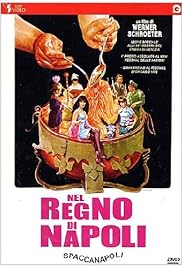THE REIGN OF NAPLES (NEAPOLITANISCHE GESCHICHTEN)(NEL REGNO DI NAPOLI)
(director/writer: Werner Schroeter; screenwriters: story by Werner Schroeter/Wolf Wondratschek/Gerardo D’Andrea; cinematographer: Thomas Mauch; editors: Ursula West-Messinger/Werner Schroeter; music: Roberto Pregadio; cast: Liana Trouche (Valeria Cavioli-Simonetti), Antonio Orlando (Massimo Pagano), Renata Zamengo (Mother Pagano), Dino Mele (Father Pagano), Cristina Donadio (Vittoria Pagano), Raúl Gimenez (Simonetti), Ida Di Benedetto (Ferrante), Maria Antonietta Riegel (Vittoria Pagano, as a teenager), Tiziana Ambretti(Vittoria Pagano, as a child), Romeo Giro (Massimo as a child), Laura Sodano (Rosa), Margareth Clementi (Rosaria), Percy Hogan (Black American Sailor); Runtime: 125; MPAA Rating: NR; producer: Christolph Hetch; Film Musuem/PAL format; 1978-Italy/West Germany-in Italian with English subtitles)
“It makes for a riveting but strange film experience.”
Reviewed by Dennis Schwartz
Eccentric artistic writer-director Werner Schroeter (“Salome”/”Malina”/”The Rose King”) gives us a personal history lesson on Naples spanning the war years until the early 1970s. It follows the everyday existence of a dysfunctional and impoverished family from Naples and a few of their neighbors. It tells us the poverty in post-war Naples was crushing and how difficult it was to grow up in the slum and keep one’s dignity without starving.
The focus of the film is on the brother and sister of the Pagano family, who are growing up in a slum. The younger Massimo follows the path of the Communist Party and remains a member even as he finds it’s not all that it seems. His protective older sister Vittoria tries to be a nun, but her widowed dad won’t allow it. Vittoria later becomes an admirer of President Kennedy in the early 60’s, and when getting a factory job learns the hard way that her best chance for survival is through education. Vittoria eventually becomes an airline stewardess, and removes herself from her family’s circle of poverty.
Other characters followed are a pathetic French prostitute; the Spanish War veteran who becomes the slum’s local C.P. leader, and his pragmatic wife, who buys rationed goods on the black market; the betrayer bourgeois attorney who uses his working-class neighbors and sells them out for his own selfish needs ; and the evil heiress/factory boss lady (Ida Di Benedetto) who tried to turn Vittoria into a prostitute.
The political melodrama follows a timeline and uses inter-titles of the year we are now following to note the beginning of a new chapter, which follows a blackout. Because of its lush visuals, grand opera style of shooting and the intensity of its story, it makes for a riveting but strange film experience.

REVIEWED ON 4/16/2014 GRADE: B